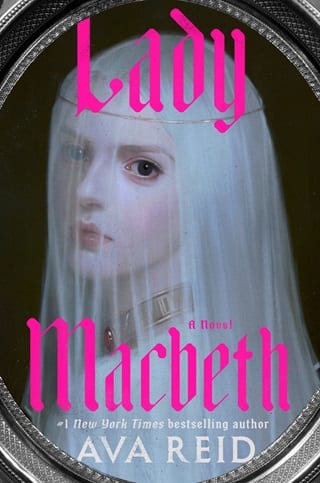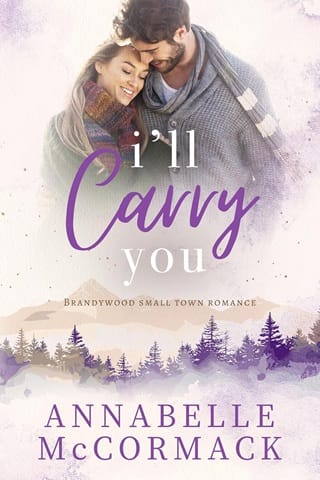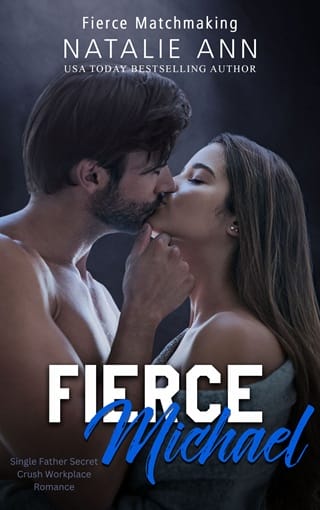Chapter Fifteen
Fifteen
Dark and dark and dark. At first she sinks into it, like a sandpit. The air and water seem to be made out of the same stuff, two miasmas of blackness, only one denser than the other. She paddles through the water and swims through the air. Reaching, stumbling. At last,she feels two hard, bony hands grasp her under her armpits. With surprising strength, she is hauled upward, onto her feet.
Left Witch: There you are.
Roscille: No, please. I cannot be here.
Right Witch: This is what we all said, at first. Your eyes will adjust.
Roscille: But what will I do?
Left Witch: Laundry, of course.
Roscille: What will I eat?
Right Witch: You can break the bones of eels between your teeth. They are softer than you expect them to be. And when you have been long enough here in the dark, you will lose your mortal vision, and you will see only what is to come, not what is or has been. Your mouth will lose its shape and mold to the speaking of prophecy. Have you noticed we no longer have lips? Well, what do we need them for? There is no one to kiss. Ha! Imagine that.
Roscille: Please. I am not like you.
Gruoch: Not now. Not yet. But you will be, if you stay. That is why you must go.
Left Witch: Go? There is nowhere to go! He may not have put you in chains, but you are trapped here, the same as we are.
Right Witch: Fool girl. If we could leave, do you not think we all would have left?
Gruoch: Silence, both of you. Were we not all this girl, once? A Lady Macbeth? Look at us now, nameless. Trapped. We have sat rotting in the dark for too long. Finally there is a chance—we can redeem ourselves in this.
Left Witch: There is no redeeming this. I do not remember my own name.
Right Witch: I can only see in the dark. My hands are made for washing and nothing more.
Gruoch: Perhaps we are lost, fine. But she is not. There is still a chance. If she claims this name, Lady Macbeth, she claims it for us all. Our visions will be her visions. Our powers her powers. Our burdens her burdens. It is not a thing to claim lightly. Do you understand?
Right Witch: Why does she deserve this chance? I have been here a quarter of a century. And you half as long, and you twice as long.
A beat.
Roscille: I do not deserve it. I should stay here, after all.
Gruoch: This is what we were all made to believe. Keep your mortal eyes open. Remember. Think.
Roscille squeezes her eyes shut, not that it makes any difference, in the dark. Yet when she does, her vision explodes in a riot of color. Memories she assumed jettisoned, abandoned like ballast, to maintain the soundness of the ship. It all roars back to her now: the mornings she spent embroidering with Hawise, reading bawdy poetry and smothering their whispers; the evenings turning wide and blue, when they were allowed to wander out of the castle on horseback, Hawise pointing out each animal they saw. The yellow-beaked starlings that blended so well with the bark, the busy red squirrels with their tufted ears, the cormorant perched in the canopy, curiously far from the sea. Hawise knew their names in Norse and Roscille knew their names in Brezhoneg, Angevin, and Saxon. They smeared berry juice on their fingers to coax rabbits from their warrens.
All of these things which have felt so far from her are here now. There was the time one of the Duke's men struck Hawise across the face, for no reason, for any reason, and then grabbed at her breasts, and Roscille was filled with an uncorrectable rage, but she waited. She watched as the man came and went from the castle and always returned with small parcels of goat's milk, such that cannot be made in Naoned for the Duke does not keep goats. Roscille pointed this out to her father and it was discovered this man had dalliances with a bastardess from the House of Capet. Well, there is no place in Wrybeard's court for men who may be swayed to the enemy's side due to matters of the heart. He was gone the next day. To where, Roscille never found out. To hell, she hoped.
Even here, in Glammis: early days, when she sat at her husband's council table and spoke, when she sent him running to Cawder to stain his hands with blood, when she ensnared Fléance in her lie, reading his boyish longings like a cipher. When she came to Lisander's room with a knife and left with a swollen, sweet-kissed mouth. When she threw herself between his cell and Banquho's whip. When she took in Senga, taught her Latin, let her braid womanly wisdoms into her hair. All of these things she did as a girl, as a lady, as a flinching foreign bride, as a witch with death-touched eyes, as Roscille of Breizh. She has believed herself an animal, simple, sharp-toothed, slippery like an eel. But she is both guilty and innocent, both girlish and wise, both witch and woman. Even the dullest creatures in cages dream of freedom. Their desires stretch and flourish, like a tree growing clever branches around the bars of a fence.
She stands in the dark, furious, fearful, thinking, blooming.
Roscille says, "I will take it. I will carry it all."
Gruoch says, "That's a good girl."
She will take everything but this. Roscille reaches up and removes the cloak, letting it slide off her shoulders and puddle in the water. The small waves suck at the furs, drowning it. Then she unclasps the necklace. It makes a small splash as it drops into the water, but then the waves drag it under, too. At last, the veil. She tears it off. Shreds the lace between her fingernails. It is lost to the damp air and darkness. Her cheeks burn with the cold, but she is free.
The witches advance. Gently, they guide Roscille toward the steps, until she can find her own way. She climbs upward, water pouring from her clothes. She touches the door's handle, jiggles the lock. The strength of one woman is not enough to break it. Nor two, nor three. But the strength of four is enough.
The witches wait in their own seething silence. Silver dreams unfold from their milky eyes and lipless mouths.
Roscille cracks the rusted metal under her hand. The door swings open. Light pours in. She looks back once at les Lavandières, to at last see their faces without the veil between them, and then she steps into the torch-warmed corridor, into the glowing, waking world.
She hears it right away, the clanging of blades. Arrows sliding into their notches. Muscles twanging as bowstrings are pulled taut and then released. She hears it with four sets of ears now, as perceptive as a hare. When the arrows hit their marks, there is the fleshy sound, like fruit being cut, the sound of men's lives being stolen from them. Roscille breaks into a run.
By the time she reaches the parapet she is breathing hard, but her legs do not ache—she has the strength of four, now.The archers who are stationed along the battlements do not pay her any mind, even though it is dangerous for a woman to be here, dangerous for anyone to be here. She finds an empty arrow loop and crouches behind it.
There, she watches ?thelstan's army advance up the hill. They are more ragged than she expected them to be: their clothes hanging off them, mud up to their knees. The rain has made the climb even more treacherous, each step risking a death-slide down the face of the cliff. They are so different from the Scottish warriors Roscille has known—no faces painted half blue, no tartans to show the intricate threading of clan loyalties, but the leather of their boots seems tougher and none of their sword-hilts are rusted.
Behind them, the trees of the copse are trees. The bushes are bushes. The animals can smell the blood and fire and are hiding in their warrens and holes. Roscille feels a helplessness overtake her, one that makes her knees tremble. The wood cannot ascend the hill. The soldiers can barely ascend the hill. Most of the arrows land with useless thuds in the grass, but when one does strike, it strikes true. Through the heart, the man falling like a slain deer, twitching and then going still.
No man of woman born. It seems no man at all will even reach the castle. The panic goes through Roscille, sluggish, each beat passing like blood behind a bruise. Where will she go, what will she do, if Glammis does not fall? Forced back into the dark, or back into her husband's bed? The same fate as all women, which she has become an animal to escape—
No. She carries the weight of four now, all their stanched dreams and suppressed desires, and she must not fail.
Five women. Senga. Fear laces up her spine. Roscille will not allow her to have Hawise's fate; she will tear apart the stone walls of the castle with her bare hands. This is what propels her back through the parapet, running, her hair coming loose from its braids and streaming out behind her. Her damp gown tangles around her legs but she does not stumble. The sea presses up from beneath the castle, straining toward the surface, and she seems to roll forward, as if carried by the invisible, underground tide.
Her new strong legs take her to Senga's room. Roscille turns the knob but it rattles and will not budge. Something is blocking the door from the other side. She presses her face to the wood and says her handmaiden's name.
A beat. Then there is a scraping, wood against stone, and the door opens just a crack. Senga's face peers through. The lines on her forehead are deep and her eyes are wet and her voice is thick when she says, "Lady—I thought you were dead and gone."
"No," says Roscille. "I am here." And then Senga opens the door wide enough for her to step inside.
When she enters, she sees that Senga has barred the door by jamming the chair beneath the doorknob, clever, as if she has done such a thing before. She has also taken the poker from the fire and holds it in her white-knuckled hand.
She sees Roscille looking, and says, "The soldiers will come. But I will not make it easy for them."
"They will not have you," Roscille says. "Even if your village is gone—your home is by my side, now, as it will always be. We will be free."
Senga's brow furrows deeper. "How?"
She takes Senga's hand. It is warm, rough in places, soft in others, and through her skin, Roscille feels her pulse, throbbing and alive.
There is no time, even, to pack a bag. She ushers Senga out of the room and through the corridors, all while listening to arrows fly and blades clang and men die like cut weeds. Her hope is this: that they will be distracted by the fumes of blood and will not notice as two women slip away.
Their brisk footsteps carry them into the courtyard, which is abandoned because every soldier is crouching in an arrow loop or cutting down his enemies on the hilltop. Roscille's mind is turning and turning as they make their way toward the stable: Take one horse, it will attract less attention, no, take a second, one will tire quickly of carrying two bodies, fill the canteens in the saddlebags, we do not know when we will next find clean water, but then they will slap against the horse's flanks and make alerting sounds.
She lets out a breath. Senga is panting. When Roscille blinks, Hawise's face replaces Senga's, only it is the white, horrified face she has conjured in her dreams, the one that screams silently as she is pushed into the black water.
No. No. This will not be like before. Roscille no longer shrinks beneath her veil. She can enchant and ensorcell her way to safety, to freedom. Her freedom and Senga's and the freedom of three women chained in the dark.
They are halfway across the courtyard when a figure steps out from the shadows. He raises a hand to shield his eyes, as if from the sun or the biting wind, but Roscille knows it is to hide himself from her gaze. She thinks she is witnessing something impossible—a waking dream—until she sees the scar lacing out from beneath his jerkin and up his throat.
Roscille chokes. "You are not dead."
"Nor are you." Fléance steps closer. "Macbeth freed me, on the condition that I fight for him. He knew he would need every man at his side. And yet he swore he sent his harlot, demon-bearing wife to hell."
"Perhaps hell could not hold me." Her blood is hot. The scars burn on the backs of her thighs, the pain striking as if it were new again, the viper flashing its silver teeth.
But she is not now what she was then. Her flesh has thickened. She may look a fragile flower, white-petaled, but this merely conceals her; it does not bind her.
"You have again given me a good chance to prove my honor," Fléance says. "What titles and favors will Macbeth bestow upon me when I deliver him the corpse of this unworthy witch, this hagseed whore?"
Beside her, Senga flinches at the words. Roscille grips her handmaiden's arm.
"Come closer, then," she taunts. "Or are you too much a coward to look into my unclothed eyes?"
"I am no coward," Fléance snarls. Even now, it is so easy to rile him, this boy playing at being a man.
And then he draws his sword, which cuts the air, and Roscille darts forward to catch him in the path of her gaze, but he is just half a heartbeat faster. She feels the heel of his hand crush her temple, and her vision sparks, and when she manages to recover her sight Fléance has his arm locked around her throat and his sword pressed flat against her belly.
Roscille writhes against him, spitting her fury. Senga falls to her knees.
"Please," she begs. "Please, my lord, do not do this."
"Your handmaiden pleads so nicely," Fléance rasps, breath in her ear. "When I am finished with you—"
That is when Roscille screams: loud enough for four voices. So loud that the sound seems to ripple out from around her, like water. Even Senga claps her hands over her ears. And Fléance winces, which gives Roscille a chance to bite down, hard, on the hand that constricts her. He shrieks. Blood spurts.
His sword digs a little bit into Roscille's side and the pain streaks through her. Everything is blurry and held at a distance, as if behind a translucent veil. This will not be my death, she thinks, furious, but if it is, I will fight until my last breath, and take every piece of him that I can with me.
And then Senga cries out, not in horror, but in pure shock, her mouth rounding into an awestruck oh. She is staring up at the sky.
The dragon's long green body unfurls like a ribbon, knotting and then stretching. The sky is rough and choky with storm clouds, but what little light there is pools within its scales, turning them iridescent. The suddenness of it, the impossibility, and the great creature's obvious strength make Fléance stammer out a wordless noise of fear.
The creature is the same—Roscille remembers the crushing might of its body around hers—but different, in ways that are not obvious to her until it draws closer.
Its thick tail is banded with thorns. Between its claws are weeds that it has ripped up from the earth. The underside of its enormous body is slicked with mud, lily pads and petals pasted on, and clinging to various scutes and appendages are tendrils of vines, sticky pine needles, and fragile ferns, as if it has just wrested itself free from a large thicket. Moss drips from the peaks of its wings.
For weeks the creature has twisted in some distant forest, hiding itself among the oily shadows and the dark leaves. It has taken this dark matter with it, and as the dragon lowers itself into the courtyard, the words of the prophecy fall into place like a key in a lock: The wood has come upon the hill.
Roscille dives away from Fléance as the dragon descends upon him. She skids on the dirt, palms burning. But she recovers herself quickly enough to turn around. And so she has the privilege and the pleasure to see this: a young man, dying in agony.
After its claws have ripped flesh and its teeth have snapped bone, the dragon vanishes. It happens within the span of moments; if Roscille had blinked, she might have missed it. There was the creature's sinewy body, stretching across the dusty courtyard, and now there is only a man, curled in on himself, naked, vulnerable. Fléance's blood stains his sides; his arms are red up to the elbows. There are still weeds and thorns tangled in his hair, braceleting his wrists and ankles. He is breathing hard.
Roscille rushes to his side and collapses there, forehead resting against his shoulder, hands clutching at his beautiful, familiar face. Air rushes out of her and so do her words. She presses herself to him and tries not to weep.
Slowly Lisander raises his head to look at her. His green eyes are wavering, inhumanly bright. At first she fears there is no recognition in them. Perhaps the dragon has at last consumed the man; perhaps he is now nothing more than the shell which holds the monster within it. But then he exhales and his lips turn up faintly at the corners and he says in a low, tired, loving voice, "Roscille."
"Lisander," she whispers. "I thought you had gone."
He shakes his head. "All this time I writhed inside the monster's body, in the woods. But even the dragon knows your face. Your voice. If such a creature has any desire greater than blood, it is to protect you."
A dragon does not have many qualities to admire, but it cannot be said that it does not want, and that it does not guard its treasures jealously. Roscille lifts one of Lisander's hands in her own. The blood is caulked deep beneath his nails. She thinks of how they must look here, kneeling in this mess of mangled flesh, two unnatural creatures who are so natural in each other's company.
Senga is watching with wide eyes and a white face. Roscille rises, and she pulls Lisander up with her. He is still weak, unused to his human body. It has been so long since his feet have touched the earth.
"Don't be afraid," she tells Senga.
But when she reaches her handmaiden, Senga merely pulls Roscille into an embrace, pressing their faces close. She holds Roscille for a long time, even while the sounds of war skid past them like rocks down a mountainside, and while the storm clouds gather. At last, she lets go. She says, "Not afraid of you, Lady, never."
Lisander, who is still holding her hand, says, "We must go. If any more of Macbeth's men spot us, we are dead or in chains."
"No," Roscille says. "This fight must end with Macbeth. There can be no other way."
"The men see this as a fight for Alba, not merely a fight for their Lord or for Glammis. It is the English who come to suppress them, again, to dilute their Scottish bloodlines. Even if Macbeth is dead, they will not stop."
"They will not stop for ?thelstan, true. But they will stop for Duncane's chosen heir, the son with the blood of Alba in him. If they see you are alive, they will know ?thelstan is not here to trample them, merely to depose the traitor and restore Duncane's line."
Lisander turns his face away from her. Shadows pass acrossit.
"You would ask them to kneel before a monster and place a crown upon its head," he murmurs.
Roscille tips his chin up, forcing him to meet her eyes. "You are more than the creature your father has made you. Perhaps you are not mortal, not entirely—but I have felt the tenderness of your flesh; I have seen the nobility of your nature; I have been blessed to know your selfless spirit. Still you are a man."
"Kiss me, then," he says, "and prove it."
She grasps his face, without reluctance, without contrition—just as she did that first time, his hand tangled in her hair, his hips rolling against her. His mouth opens to meet hers, the ask and the answer. He bites her lower lip, the faint surfacing of the monster, but his tongue is gentle, soft with mortality, and his arms are endlessly tender. When she breaks the kiss at last, their hearts beat furiously in tandem.
Without letting his arms drop from her waist, with their foreheads still close, Lisander whispers, "I will show myself, then. I hope they will see what you do. I hope it will be enough."
Wind sweeps the courtyard, blowing in the storm from the sea, where lightning has already begun to crack the air and waves are rising in great heights. On the other side of the wall, men are falling like struck trees. And reluctantly, Roscille removes herself from Lisander's embrace.
"If you are to show yourself," Senga says drily, "perhaps it should not be all of yourself."
Lisander, as if he has only now remembered his nakedness, flushes.
To Senga, Roscille says, "Find him clothes. I will go after Macbeth."
"No," Lisander says at once, seizing her again by the arm. "He has no honor left in him; only ambition and rage. He will think nothing of striking you down. At least let me—"
"You cannot," says Roscille. "There is a prophecy. No man of woman born can slay him." She does not have to say the rest. The thoughts drift out from her like silvery visions, like spirits escaping their vessels. I am not a man. Not quite a woman, either. Roscille of Breizh, beautiful, witch-kissed, witch.
Soldiers beyond the wall roar and choke on the blood in their mouths. Evander is among them. Perhaps slain already. For all the men who drop to their knees when they see Lisander alive, there will still be more who rally behind their limping, diminished Lord.
It will not end, truly, until Macbeth is dead. Roscille releases Lisander's hand, and she goes into the depths of the castle.
Roscille knows where to wait for him. When ?thelstan's men are bashing in the barbican, when Evander's head is brandished on a pike, when the battle is either lost or won, Macbeth will come here. The iron door is behind her, cold air slipping through the cracks in the wood. The torches gutter against the wall. Beneath her feet, the ocean roils in its endless rhythm.
She hears him coming before she sees him: that shuffling gait, the hot breath exhaled through his flared nostrils. As he grows closer, around the last bend in the corridor, she sees a hand shoot out and grip the wall. It is streaked with blood both old and new, bright red and rust-hued, announcing all the deaths he has made. And then he comes, his enormous body penetrating the narrow hall, his shoulders so broad he can barely fit through.
He towers like a giant. This was Roscille's fearful first impression of him, his preternatural largeness. Yet she is not afraid like she was then, kneeling before the Druide, letting him yoke them together with his bristly rope. All her chains have been slashed, all her vows broken.
Macbeth's eyebrows leap up his face when he sees her—a brief moment of shock, and then his lips pull back in a snarl.
"You should not be here. You should be growing ancient and blind in the dark."
"And what prophecy would you hope I speak?" Roscille draws herself up. He is not quite close enough to meet her eyes. "Your doom is written already, and it is close. The wood has come high upon the hill."
"Liar," he says. "It is impossible."
"You yourself have witnessed many impossible thingscome true."
"Impossible for ordinary men," he says. "I am not so constrained. No mortal means can fell me. The only impossible thing is my death."
"If you are so certain," Roscille says, "then look into my eyes."
Macbeth smiles cruelly. Blood is so wet on his face that it glistens still.
"You have always thought yourself too clever," he says. "Roscille of Breizh. You have never kept to your place. I should have tied you to my bed the moment you stepped upon Scottish soil. You have worked in the shadows, fooling all with your innocent face, hiding your secrets beneath your veil. Well, it is off now. And I can see you truly. Your father is writ all over you. He has crafted this tale, that you have been cursed, that you hold this power of compulsion. And perhaps for those who believe such superstitions, it is real enough. But had he not spread this story in Breizh and beyond, you would have no power at all. The only real power you have ever had is the dagger I placed in your hand."
Roscille stands marble-still. Indeed, her father was the first to speak the words aloud— perhaps you were cursed by a witch. Before, it was no more than whispers and rumors; her beauty was strange enough to make men shiver, but she never compelled, enchanted, ensorcelled. It was just the stable boy, and could his own lust not have moved him? Then there were Duncane's guards—but there she had acted only at Macbeth's direction. Her magic, blooming only at the cultivation of men. Could it be so, truly?
A coldness creeps into her bones. Doubt, boring like a trephine.
Macbeth sees this doubt and his smile deepens. "So come then, Roscille. Roscilla. My dear wife. Lady Macbeth. Other men may have cringed from you, but I never have. Look into my eyes. I will look back and I will not tremble."
He slouches toward her, lumbering like an unwieldy creature half turned to stone. Roscille takes a stumbling step backward. The animal fear returns to her. Her own ghost inhabits her body—that girl, cowering in her bridal lace, is here again now. And Macbeth, Bellona's bridegroom, Thane of Glammis, Thane of Cawder, King Hereafter, is reaching for her with his blood-slicked hands.
Her back hits the door and the salt air winds around her ankles. Chains, she thinks, there are always more chains. But then she thinks of the three women on the other side, seething in the dark. They broke the lock, the four of them, together.
Her chest swells. And then she rises to meet Macbeth's eyes.
She has never looked into them before—the irony; she never dared. They are blue, and clear enough that she sees herself reflected back, like a fish darting through a small pool of water. At first nothing shifts in their surface. There is only the same fierceness and fury and preening victory, the certainty that she will fail. But Roscille keeps staring.
Slowly, a cloudiness overtakes him: The whites of his eyes seep into the irises, then the pupils, until his gaze is milky and matte, and she sees nothing reflected back. Macbeth gives a throaty cry and tries to turn away, but Roscille grasps his face in both of her hands and forces his gaze back to hers.
He falls to his knees. She stands over him. His veins bulge, and their color changes to a dense, tarry black. His skin, by contrast, grows paler and paler; it is the bone beginning to show through, his flesh wasting away, until there is only the meat and muscle of him, and a naked skull. His scream dries up in his throat.
And then there is no sound but that skull striking the stone floor. Roscille steps away, hands dropping to her sides.
Voices behind her, breaching the door. Three of them braiding together, like a tangle of weeds showing their shy heads in the soil, breaking apart the hard, cold earth, and straining upward into the light.
 Fullepub
Fullepub 



